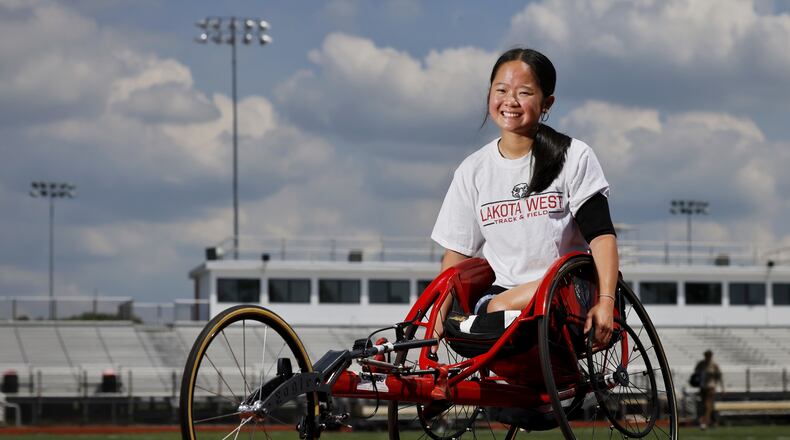Last season as a freshman at Lakota West High School, Jun placed fifth in the 100 and 400, said her mother and track coach, Shannon McKnight.
It’s been quite a journey for Jun and the McKnight family.
Greg and Shannon McKnight, already the parents of three boys, Jacob, Will and Cooper, wanted to adopt a child with a limb difference.
“Call it God whispers, signs or whatever your readers want to call it,” she said. “We couldn’t ignore the things that were coming up.”
They filled out the piles of the adoption papers, prepared themselves for raising a special needs daughter and flew to China.
“We just knew she was the one,” Shannon said. “I started feeling her with me.”
Shannon traveled alone for the first week while her husband, a mechanical engineer, stayed home with the three boys.
The initial mother-daughter interaction didn’t resemble a Hallmark Mother’s Day card.
“She was terrified,” Shannon said of Jun. “They had shaved her head. She was frail. We were like two complete and utter strangers. Two strangers staring at each other.”
McKnight said Jun connected more with her father until she took up track.
“That started this adventure we didn’t know about,” she said.
They have been a track team ever since.
Jun, 15, was introduced to track and field after her sister, Mae, 13, also a girl from China with special needs the McKnights adopted, started playing basketball.
“She wanted to feel included,” Shannon said of Jun.
So Shannon watched videos on adaptive track and pitched the idea to Jun. The mother knew the important life lessons athletes can learn through sports.
The family rented a used track chair, but since it didn’t properly fit Jun, it was difficult for her to maneuver.
“We just wanted to get her from point A to point B before the end of the season,” her mother said.
Then, during an eighth-grade meet at Mount Healthy, Jun had the “race of her life,” her mother said. Her time qualified her for the junior high state meet.
Before that track meet, Jun later told her parents she wanted to quit. One race changed all that.
“What I saw in her eyes and on her face that day was incredible,” Shannon said. “It was everything that we wanted for her.”
When Jun entered high school, she was fitted with a different track chair thanks to a grant from the Bridge, an organization that connects people to adaptive sports and recreation.
“That allowed me to go faster,” Jun said of the properly fitting chair.
Now she’s returning to state for the second consecutive year. Throughout the regular season, Jun’s only opponent is the stop watch. She qualified for the state based on her time, not where she placed.
At state, this year at Welcome Stadium in Dayton, Jun will race against other para-athletes. The goal this year is a third-place finish, two better than last year.
“My experience from last year will help,” Jun said.
Shannon credits the Lakota district for opening doors for her daughters and other special needs athletes. The family has received support from school administrators and coaches, she said.
“To me, I’m super grateful as a parent,” she said. “The district stepped into the unknown. We want our kid to be included. The district said, ‘She’s a part of us.’”
Jun agreed: “You just want to be included. The community has supported me and brought me out of my shell.”
There are 220 track athletes at Lakota West, and Jun is the only para-athlete. Her body makes her different, but she’s still a Firebird.
“The track and field family has grown through this,” her mother said. “We cross each bridge together. I’m very grateful for the growth seen in our track and field community.”
Sean Hart, the team’s distance coach, works with Jun, especially as she prepares to compete in the 800-meter. He helps Jun with her pace. Running 800 meters is different from running 100 meters.
“This takes a team effort on everybody’s part,” her mother said. “People are in it with you. That’s what we have. People standing with you in the trenches. It makes you want to be a better athlete.”
Shannon hopes her daughter’s success, and the attention it has brought, draws more students with disabilities into extra-curricular activities. She “hates” the word disability. She prefers differently abled.
Then the conversation turned back 13 years when the McKnights decided to adopt a child with a limb difference.
She understands that Jun, a standout athlete who leads a Bible study for kindergarten students, wouldn’t have those same opportunities in her homeland. Some children with disabilities are discarded and left homeless on the street.
“I was sad when I was there,” she said of her time in China. “You saw glimpses of what her future looked like. But her life was changing because of a purposeful decision. I knew what we were bringing her back to. I saw the same opportunity for her as the children I gave birth to.”
About the Author

